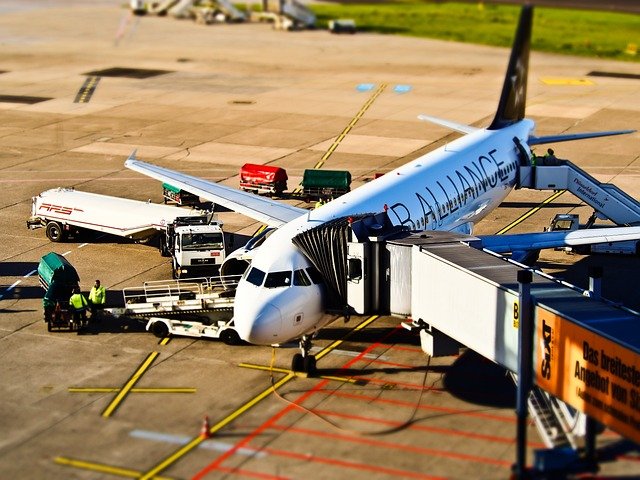Sky-High Careers: Unlocking Opportunities in Airport Employment
Discover the diverse and dynamic world of airport careers, where opportunities soar as high as the planes themselves. From ground operations to air traffic control, airports offer a multitude of roles suited to various skills and ambitions. Explore the qualifications needed, potential career paths, and the unique benefits of working in this ever-evolving industry. Whether you're a seasoned professional or just starting out, find out how you can take your career to new heights in the exciting realm of airport employment.

The aviation industry presents a vast array of career opportunities, with airports serving as the central hub for numerous exciting roles. Let’s explore the diverse landscape of airport employment, from entry-level positions to high-flying executive roles.
Diverse Roles in Airport Operations
Airports function like small cities, requiring a wide range of professionals to keep operations running smoothly. Here’s a glimpse into some key positions:
-
Air Traffic Controllers: These highly skilled professionals manage aircraft movements, ensuring safe and efficient air travel.
-
Passenger Service Agents: The face of the airport, these individuals assist travelers with check-ins, boarding, and general inquiries.
-
Cargo Specialists: Responsible for managing the complex logistics of air freight, from documentation to loading.
-
Security Officers: Vital team members who maintain safety through passenger screening and vigilant monitoring.
-
Aircraft Technicians: Skilled workers who keep planes in top condition through regular maintenance and repairs.
-
Airport Management: Overseers who coordinate various departments to ensure seamless airport operations.
This list merely scratches the surface of the myriad opportunities available within airport settings.
Essential Qualifications for Airport Careers
While specific requirements vary by position, certain qualifications and skills are highly valued across the board:
-
Educational Background: Ranges from high school diplomas for entry-level positions to specialized degrees for technical roles.
-
Customer-Centric Attitude: Crucial for roles involving direct passenger interaction.
-
Technical Aptitude: Necessary for positions in aircraft maintenance, air traffic control, or IT systems.
-
Physical Capabilities: Important for jobs involving manual labor or extended periods of activity.
-
Security Clearance: Often mandatory due to the sensitive nature of airport operations.
-
Multilingual Proficiency: A significant advantage, especially in international airports.
-
Adaptability: The ability to thrive in a fast-paced, ever-changing environment is essential.
Depending on the specific role, additional certifications or licenses may be required.
Launching Your Airport Career
Embarking on an airport career can be an exhilarating journey. Here’s a roadmap to help you get started:
-
Explore Your Options: Research the various airport roles to find those aligning with your interests and strengths.
-
Pursue Relevant Education: Enroll in programs or courses that cater to your chosen career path.
-
Gain Practical Experience: Seek internships or entry-level positions to build your skills and industry connections.
-
Acquire Necessary Certifications: Identify and obtain the certifications required for your desired role.
-
Build Your Network: Attend industry events, join professional associations, and connect with aviation professionals.
-
Polish Your Application: Craft a compelling resume and cover letter that highlight your relevant skills and experiences.
-
Stay Persistent: The aviation industry can be competitive, so maintain your determination and continue skill development.
Perks of Airport Employment
Airport careers offer numerous advantages that make them attractive options:
-
Global Exposure: Interact with people from diverse cultures and backgrounds.
-
Travel Benefits: Many positions offer discounted or complimentary travel perks.
-
Job Security: Airports are essential infrastructure, providing relatively stable employment.
-
Career Advancement: Opportunities for growth and skill development across various departments.
-
Dynamic Environment: Work in an exciting atmosphere with constant activity and new challenges.
-
Competitive Compensation: Many airport positions offer attractive salary packages.
-
Meaningful Impact: Play a crucial role in facilitating global connectivity and commerce.
Navigating Challenges in Airport Roles
While rewarding, airport careers also come with unique challenges:
-
Unconventional Hours: Many positions require shift work, including nights, weekends, and holidays.
-
High-Pressure Situations: Dealing with delays, cancellations, and security concerns can be demanding.
-
Physical Demands: Some roles involve extended periods of standing or heavy lifting.
-
Strict Compliance: Adhering to rigorous security and safety protocols is crucial.
-
Continuous Learning: Keeping pace with evolving technologies and procedures is necessary.
-
Weather-Related Disruptions: Severe weather can impact operations and create challenging work conditions.
-
Fast-Paced Environment: The need for efficiency and punctuality can be stressful.
Despite these challenges, many professionals find the excitement and benefits of airport careers outweigh the difficulties.
Future Outlook for Airport Employment
The future of airport careers looks promising, with several factors contributing to potential growth:
-
Increasing Air Travel Demand: As global tourism and business travel rise, airports will need more staff to handle increased passenger volumes.
-
Technological Advancements: Innovations in aviation and airport management will create opportunities for skilled professionals.
-
Sustainability Initiatives: Airports’ focus on environmental friendliness is creating new roles in green technology and sustainability.
-
Enhanced Security Measures: Ongoing efforts to improve airport security will likely lead to more jobs in this sector.
-
Infrastructure Development: Many airports are undergoing expansions or renovations, creating construction and project management opportunities.
-
Emerging Markets: Developing countries’ investments in airport infrastructure may open up new job markets.
-
E-commerce Growth: The rise of online shopping is driving growth in air cargo, increasing demand for related airport jobs.
While the aviation industry can be sensitive to economic fluctuations, the long-term outlook for airport careers remains optimistic.
In conclusion, airport employment offers a diverse and exciting array of opportunities for individuals with various skills and interests. From customer-facing roles to behind-the-scenes technical positions, the aviation industry provides a dynamic work environment with potential for growth and development. While challenges exist, the benefits and future prospects make airport careers an attractive option for those seeking a rewarding and stimulating professional path. Whether you’re drawn to the excitement of air traffic control or the satisfaction of ensuring passenger safety, there’s likely an airport role that aligns with your aspirations and talents.






